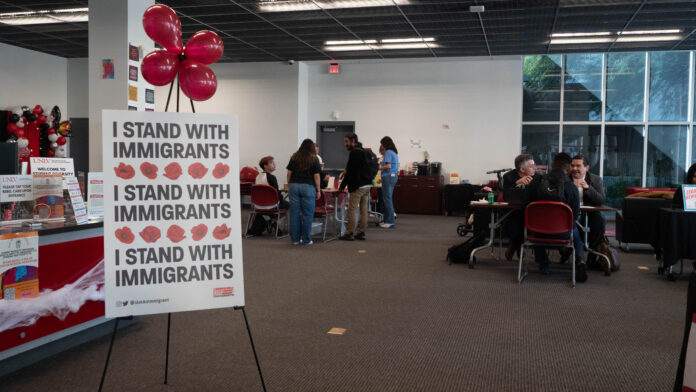
On Oct. 25, students participated in an event titled “I Stand with Immigrants” at the Student Diversity Programs Lounge in the Student Union. The day of action was in solidarity with 200 other campuses across the United States for the purpose of calling on higher education institutions to offer robust support to undocumented students, faculty, staff, and community members.
Members of the UNLV Undocumented Students Program (USP) organized the event, which consisted of tables where students were able to create art pieces as a keepsake and an informational presentation on undocumented students. Students were also able to meet with representatives from the UNLV Immigration Clinic and receive any legal services free of charge.
“‘I Stand With Immigrants’ really aims at building that community and showcasing it out to the campus community to show our support for our immigrant communities,” said USP Coordinator Nayelli Rico Lopez. “We understand that our immigrant and undocumented communities often face a lot of backlash in the media and within our societies. We want to make sure that they know that we stand with them and value their contributions to our country and recognize their humanity as well.”
Undocumented students face many difficult hurdles and misinformation regarding higher education. “We have students that come to USP and haven’t even realized that higher education is something that they can achieve,” Lopez explained.
She brought up the available resources for undocumented students that USP offers assistance with, including scholarships and financial aid, such as the Dream.Us National scholarship, one of the largest for undocumented and immigrant students. Application for the scholarship opens on Nov. 1.
“So that’s one of the goals that we have,” Lopez continued. “Educating our community and telling them that even though there are additional challenges, you can still get your degree and we can figure out the different ways that you can utilize that after graduation.”
Dr. Sandra Candel is a UNLV professor who teaches Interdisciplinary, Gender, and Ethnic Studies and attended the event to show her solidarity. She spoke of the importance of understanding intersectionality and being an ally.
“Intersectionality, easily put, is just those factors that provide us with either power, privilege or oppression,” Candel said. “One privilege of mine is being a documented immigrant. With that privilege, I can use my voice to amplify the voices of undocumented immigrants. The way I exercise my allyship is by teaching the courses that I teach. Regardless if I’m teaching for the College of Education or the Department of Ethnic Studies, like I am right now, I always include immigration topics because my goal is to educate.”
To this day, undocumented immigrants are still referred to as “illegals.” Candel expressed the importance of language on the subject of immigration. “Language matters because it is the first step to dehumanization.” she said. “A lot of the time, we use inappropriate language because we simply do not know. I believe that there are acts which are illegal, but human beings are never illegal.”
In 2010, the Applied Research Center launched a campaign called “Drop the I-Word” which criticized the term “illegal immigrant,” stating that it is legally misleading because being undocumented is a civil offense, not a criminal one, and that it scapegoats individuals for issues that are systemic. Since then, many news organizations have begun to use the term “undocumented” instead of “illegal.”
Deferred Action for Childhood Arrivals (DACA) protects people who are undocumented and came to the United States as children from deportation and grants eligibility for a work permit. Currently, the program is in limbo after President Biden’s reinstatement of it was deemed to be illegally implemented by a district court judge in Texas. Current DACA recipients are able to renew their status as the case goes through the appeals process, but no new applications are being taken at this time.
“A lot of rights of minority communities are being targeted right now,” Candel said, “However, at the same time, I see a mobilization of allies between communities. I will always have hope in humanity and the younger generations.”
The UNLV Immigration Clinic offers free consultations and legal services to UNLV students, staff, and their families. The clinic is able to assist with unaccompanied children facing deportation, detained adults in deportation proceedings, and DACA renewals. If assistance is needed, contact their office at (702) 895-2080, or fill out an intake form on their website.
Follow @uspunlv or the student organization @undocunetwork on Instagram for future events and information.
